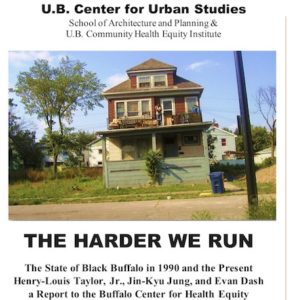 The Harder We Run: The State of Black Buffalo in 1990 and the Present — is a follow-up to a study prepared 31 years ago that aimed to determine how the city’s emerging knowledge-based economy impacted the African American community. The 1990 study sought to determine which way the Black socioeconomic trajectory was trending.
The Harder We Run: The State of Black Buffalo in 1990 and the Present — is a follow-up to a study prepared 31 years ago that aimed to determine how the city’s emerging knowledge-based economy impacted the African American community. The 1990 study sought to determine which way the Black socioeconomic trajectory was trending.
Both studies were led by Henry Louis Taylor, Jr., director of the Center for Urban Studies and a professor of urban and regional planning in the School of Architecture and Planning at the University at Buffalo of the State University of New York System. He is also an associate director of the university’s Community Health Equity Research Institute.
 The 1990 study, which was known as the Black Buffalo Project, identified numerous core problems facing Buffalo’s Black community. Importantly, it also outlined a guide for tackling those issues. However, “When we looked back, the city leaders never addressed the core problems facing the African American community,” Dr. Taylor says.
The 1990 study, which was known as the Black Buffalo Project, identified numerous core problems facing Buffalo’s Black community. Importantly, it also outlined a guide for tackling those issues. However, “When we looked back, the city leaders never addressed the core problems facing the African American community,” Dr. Taylor says.
“When we looked at these trend lines some 31 years later, we see no reversal,” he adds. “We see us not getting closer to any of the goals and objectives that we outlined. We see that with some of the critical metrics — the poverty rate, household income, homeownership, employment — not only is there no progress, there’s no change. When we say there’s literally no change, we’re saying that in a lot of ways the situation is more entrenched, more solidified.”
Dr. Taylor is a graduate of Tennessee State University, where he majored in speech pathology. He holds a master’s degree in audiology from the University of Tennessee and a master’s degree and a Ph.D. in urban studies from the University at Buffalo.









